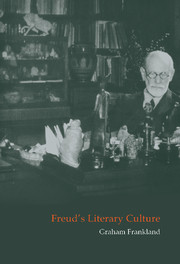Book contents
- Frontmatter
- Contents
- Preface
- Acknowledgements
- Introduction
- Chapter One The unconscious of psychoanalysis: Freud's literary allusions
- Chapter Two A sublime ambivalence: Freud as literary critic
- Chapter Three The literary-critical paradigm: sources of Freud's hermeneutic
- Chapter Four The frustrated Dichter: literary qualities of Freud's text
- Conclusion
- Notes
- Bibliography
- Index
Chapter One - The unconscious of psychoanalysis: Freud's literary allusions
Published online by Cambridge University Press: 22 September 2009
- Frontmatter
- Contents
- Preface
- Acknowledgements
- Introduction
- Chapter One The unconscious of psychoanalysis: Freud's literary allusions
- Chapter Two A sublime ambivalence: Freud as literary critic
- Chapter Three The literary-critical paradigm: sources of Freud's hermeneutic
- Chapter Four The frustrated Dichter: literary qualities of Freud's text
- Conclusion
- Notes
- Bibliography
- Index
Summary
FUNCTION AND FORM
In a letter written in 1906 Freud answers a publisher's request to name ten ‘good’ books. As he openly declares he has deliberately excluded books of purely aesthetic value, the list offers only a limited insight into his literary tastes. He cannot, however, resist mentioning some works he would have included in a list of the very greatest works of literature: Sophocles' tragedies, Goethe's Faust, and Shakespeare's Hamlet and Macbeth. Anyone familiar with Freud's own writings will immediately recognize that these are, by far, the works to which he most commonly alludes. The author he most frequently refers to is undoubtedly Goethe. Although over half of these references are to Faust, only one is to the second part of that tragedy, and this – the epigraph to The Psychopathology of Everyday Life – was suggested by his friend Fliess. (Freud did not usually need such prompting; indeed, Fliess had to dissuade him from using a Goethe quotation as the epigraph to The Interpretation of Dreams.) Only Shakespeare comes close to Goethe as a source of allusions, and, although Freud refers to about fifteen of his plays, again half of the references are to one work, Hamlet. Mainly due to Jokes and their Relation to the Unconscious, Heine is the next most quoted author, followed very closely by Schiller. Goethe, Heine, and Schiller apart, though, Freud is more likely to refer to classical Greek and Roman literature than to any other German author.
- Type
- Chapter
- Information
- Freud's Literary Culture , pp. 6 - 62Publisher: Cambridge University PressPrint publication year: 2000



